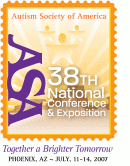 |
The ASA's 38th National Conference on Autism Spectrum Disorders (July 11-14, 2007) of ASAThe Westin Kierland Resort & Spa, Scottsdale, AZ |
| For a complete author index with session numbers, please click here | |
| Friday, July 13, 2007: 10:30 AM-11:45 AM | |||
| Tribal A & B | |||
| #2366- Providing Quality Training for Educators Using Multiple Distance Education Technologies | |||
| The Kansas Instructional Support Network (KISN) is a grant funded through a Title VI-B grant from the Kansas State Department of Educationís Student Support Services. The proposed session will examine the implementation of high quality professional development and technical assistance on a budget! KISN identified resources, including people, locales and technologies that were available to coordinate the delivery of training and technical assistance. The presentation will provide participants with an outline of the process and timeline used in developing the system. | |||
| Presenters: | - Lee is the Director of the Kansas Instructional Support Network and an independant consultant for the Autism Society's employment program with AMC Theatres. Lee has worked in the field of ASD for more than 25 years as a teacher and as a trainer for the state of Kansas. Lee graduated from the University of Kansas with a Master's degree in Special Education with an emphasis in Autism and Asperger's Syndrome. Lee has presented at the state, regional, national, and international level.
- Jane Goetz is the Autism Training Coordinator for the Kansas Instructional Support Project. Prior to her work with KISN, Jane served as the low incidence consultant for the Northwest Kansas Education Service Center in Oakley, KS. Jane participated in the University of Kansas Autism Outreach Project and is vastly experienced in the area of autism. | ||
|
| |||
|
The proposed session will examine the implementation of high quality professional development opportunities and technical assistance on a budget! The Kansas Instructional Support Project identified resources; including people, locales and technologies, that were available to coordinate the delivery of training and technical assistance. The process and the evidence 1. Identify the resources in Kansas. There were many resources in the state that consistently under-utilized. Those resources range from people to classrooms to technology. A successful training system needs to identify resources, overcome barriers to implementation, and then coordinate their use. 2. Identify needs. We examined the research that delineated teacher competencies and used this information as the basis for developing training objectives. 3. Coordinate stakeholders; however, limit the size of the group! We brought together faculty from various state universities to act as an advisory group to KISN. We also included personnel from another statewide project to draw on their experience in professional development. 4. Identify potential speakers to address training objectives to meet the needs of teachers and students. 5. Recruit participant teachers, offer graduate credit through a variety of state universities. 6. Provide registration, use available technology to facilitate the process. 7. Deliver training, be creative and put previously trained individuals in leadership roles. 8. Gather evaluation data. 9. Analyze data, no really, once data is gathered it needs to be analyzed and responded to in order to improve the product that is being delivered. 10. Respond to areas of concern, make it better. This information has application at various levels of training. Some of the various technology components can be applied at the building, district state and national level. There are many reasonably priced technologies that can serve as resources when more expensive technologies are not available. Most states and districts do not have the financial resources to purchase and expensive technology. The experience in Kansas has taught us that the technology that we use, as in all activities involving more than one system, is only as good as its weakest component. The audience will be introduced to a training and technical assistance model that will find application at many levels. High quality professional development opportunities need to be provided to educators, parents and service providers; through utilizing the distance education model we can effectively share information regarding best practice, develop Communities of Practice and improve services to those on the autism spectrum. Participants will: 1. describe the advantages of video conferencing and the effective use of interactive television for delivery of training and technical assistance. 2. identify the resources available to develop and deliver high quality professional development and technical assistance in a rural state.
|
|||
See more of General Submissions
See more of The ASA's 38th National Conference on Autism Spectrum Disorders (July 11-14, 2007)